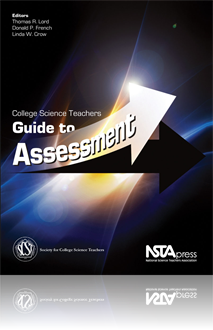All Book Chapters
Book Chapter
In recent years, the value of using authentic assessments to evaluate student learning has been discussed at all levels. The use of authentic assessments, in the use of lesson plans, has proven to be a valuable tool for the evaluation of content mast...
Book Chapter
Formative Assessment With Student Remotes and E-mail
This chapter features two formative assessment techniques that were implemented in several sections of the first semester of an introductory physics class at East Stroudsburg University. The performance of these students was compared to sections in w...
Book Chapter
Peer Assessment: Value, Fears, Headaches, and Success
The idea of peer assessment sounds fantastic and literature shows that it is invaluable. Yet, when most faculty first try peer assessment they are faced with a different reality. This chapter focuses on the obstacles of peer assessment with the first...
Book Chapter
Working With Student Engagement
"Classroom assessment informs teachers how effectively they are teaching and students how effectively they are learning" (Cross 1996). For this purpose, in this chapter the author constructed an assessment tool known as the Diagnostic Learning Log (D...
Book Chapter
Promoting Student Reflection on Exams
One of the greatest challenges in assessing student performance is providing students with the detailed and appropriate feedback they need to learn from their mistakes. Summative assessments, in the form of exams, are used to determine what students ...
Book Chapter
Hypothesis Modification Activity
Many upper-level undergraduate science courses are content and data laden, leaving little room for students to practice important skills such as generating hypothesis and designing experiments. This chapter introduces The Hypothesis Modification Acti...
Book Chapter
Exam Corrections and Analysis, Student Perspective
One of the most difficult parts of being a teacher is giving exams back to students when you know, and students know, that they did not perform well. Students also perceive instructors as being tricky or unfair on exams. To help combat this perceptio...
Book Chapter
Exam Analysis, Instructor Perspective
In this chapter, the author addresses what she thinks is the most difficult job of an instructor—effectively assessing what students have learned. Most instructors can articulate what they want students to know at the end of a unit or class, but de...
Book Chapter
Inquiry-Based Labs: The Scientific Report
In this chapter, the author teaches a General Biology I course with five inquiry-based laboratories. Although it is an introductory biology course for both majors and nonmajors, students are very engaged in the scientific process. A Scientific Report...
Book Chapter
In every science course the author teaches, students choose and read a book available in the campus library and submit a review at the end of the course. The student's review outlines the appropriateness of this book for someone taking the course in ...
Book Chapter
In the author's Biology 350 (genetics) course, the students assemble and demonstrate models to teach concepts related to course content topics. Each student chooses one article from a selection of published papers that describes teaching models for d...
Book Chapter
Eleven Assessment Lessons Learned at the Gate
As a "gateway" instructor for more than 30 years, the author learned a few things about assessing the "typical" community college student. "Gateway" is the polite euphemism for suggesting you will always be teaching the nonscience majors with the hop...
Book Chapter
Developing Assessment Performance Indicators
The goal of assessment is to judge how well a student has learned. This information has a range of uses but is mainly used to improve student learning or for the accreditation of student performance. This chapter is the first attempt to develop a val...
Book Chapter
Practices That Jeopardize Bona Fide Student Assessment
Student assessment is the means by which teachers—the directors of the learning experience—appraise the success of their lessons on students—the product of the instruction. Teachers at every level of instruction realize the importance of fair, ...
Book Chapter
Varied Assessment: A Brief Introduction
Although often seen as a means for evaluation, assessment is first and foremost an instructional tool. Use of multiple assessment strategies can provide students with diverse feedback, allowing them to view the subject and their understanding of it f...


